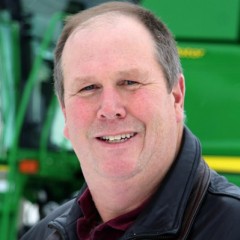Let’s say that you are thinking about retiring but you have no family members who want to farm. If you’re like most Canadian farmers facing this prospect, you will consider just two options, either to sell the farm or to rent it out.
Or let’s say you are thinking of leaving land to a family member who has a career in the city. Again, they would only have two options. Either they would sell the farm, or hold onto it and rent the land out.
Read Also

How scientists are using DNA and climate data to breed crops of the future
A method for forecasting how crops will perform in different environments so that plant breeders can quickly select the best parents for new, climate-resilient varieties.
Now, a growing number of U.S. farmers are opting for a third strategy, hiring a professional farm manager to operate the farm on their behalf. Professional farm managers now oversee the farming operations on an estimated 15 per cent of U.S. farmland.
On some of those acres, the professional manager gets called in because the farmer wants to focus on business management, not the nuts and bolts of how to get a crop in the ground. More and more, however, managers are also getting called on to provide better incomes for landowners who don’t want to do the farming themselves.
Gerald Murray was born and raised on an Illinois family farm that was first settled by his great, great grandfather in 1864. As a young man, he moved to California to pursue a career in the U.S. Marines. Then, upon the death of his parents, he inherited the 204-acre farm he grew up on.
Until 1990, Murray rented his land to a neighbouring farmer but found being an absentee landlord very stressful. Furthermore, trying to manage his farm from a distance wasn’t very profitable. The yields he was receiving in the crop-share arrangement were very disappointing. “In 1990, my share of the soybean crop was just five bushels to the acre,” Murray says.
Then Murray hired Nebraska-based Farmers National Company (FNC), the largest professional management company in the U.S. “The following year, after hiring FNC, the soybean yields went to 48 to 50 bushels,” Murray says. “My corn production tripled.”
Murray credits the management and oversight of FNC for turning the situation around. “The farm managers at FNC have very sharp pencils,” Murray says. “They are very prudent with my money. They solved the problems on the farm. I could sleep well at night after hiring FNC and I would recommend them to anybody, anywhere.”
Murray also appreciates the regular reporting he now receives on all aspects of farm operation. He points out FNC hosts a full-day workshop every two years at various locations around the country for absentee landowners such as himself to get updates on new laws pertaining to agriculture and to learn about new production practices.
Farm chat lines across the U.S. suggest that the results with FNC depend on local specifics, including the skill and commitment of the individual manager who gets appointed to oversee the farm. The chat lines also buzz with charges that FNC’s first job is to make money for FNC, not for the landowner.
That said, one of the factors driving FNC’s growth is that landowners often aren’t happy with the results they’re getting by renting to nearby farmers. Nor are they happy with the way the relationship with traditional renters is working.
Unlike Murray, Minna Lou Mercer of Omaha, Nebraska, never lived on a farm and was far removed from farming when she inherited five farms, including properties that have been passed down through her family since the Civil War.
Mercer lists a number of reasons for retaining ownership of the land. “My mother had a very strong attachment to the land that her grandfather had farmed,” Mercer says. “For 70 years she told me ‘don’t sell the home place!’ Before she died, she did tell me I could do what I want with the land. But farmland is something solid. I don’t see a need to sell. And land is a good investment.”
Yet at the same time, Mercer doesn’t want to manage her farms herself. She knows family farms have changed a lot. Farms are much bigger. Meeting with a tenant and planning a crop share is complicated, and it is especially difficult in her situation where the farms are widely spread geographically. So Mercer hired FNC to manage her farms and has been very satisfied.
“I am really happy with the job FNC is doing,” Mercer told Country Guide. “They consult with me regularly. They are very responsive to my needs and they are very interested in the land.”
Testimonials like these are driving the interest in hiring professional managers. They are also why 1,500 of FNC’s clients have been with the company for over 25 years and 300 have been clients for over 50 years.
Mike Krause epitomizes the professional farm manger. In fact, in 2010 he was named professional farm manager of the year by his peers, the members of the American Society of Farm Managers and by the award’s co-sponsors, Syngenta and AgProfessional magazine.
For the past 12 years Krause has worked as a professional farm manager for Hertz Farm Management Inc. This company was founded in 1946 and provides professional farm management services on more than half a million acres in the U.S. Midwest.
Krause sees his job as “working on behalf of the absentee landowner to improve the farms I manage and to improve the net income of my clients.”
Hertz’s clients are a diverse group. A client may be someone who previously farmed the land and is now retired from farming. Or it may be the widow whose husband farmed the land and who now needs help in managing the farm.
Equally, a client may be someone who has never farmed, but has inherited the land. Or it may be an individual or a group of investors who have purchased the farm as an investment. (In fact, investors represent a growing segment of the clientele of farm management companies.)
The professional farm manager may also be hired by a trust or bank which owns land.
Regardless of what type of individual or entity owns the land, Krause says the role of the professional farm manager is the same. He or she must assess the needs of the owner and determine the risk, goals and objectives of the owner of the land.
The manager then needs to select an operator and develop an operating agreement that will meet the needs and goals of both the landowner and operator. “A lease must be a win-win for both parties.” says Krause.
Usually, the selected operator is a local farmer. Krause tries to find an operator as close as possible to the farm he is managing, often within a five-mile radius. This increases the ability to get field operations done in a timely manner and also reduces equipment costs.
Yet hiring an operator is the beginning, not the end of the job for the farm manager. The professional farm manager then works in conjunction with the operator, custom applicator, and landowner in crop rotation decisions, seed selection, and in making input purchases.
Large farm management companies will have a team of experts within the company that the manager can call upon for recommendations on soils, agronomy, and input requirements to improve production in those problem fields.
One benefit of hiring a professional farm management company is that volume purchases of crop inputs made by a farm management company can lead to a 20 to 25 per cent discount in price of the inputs. The farm management company typically offers the operator access to these cheaper inputs for the operator’s own farm as well as the land he is farming for the company, so both the landowner and operator benefit from lower costs.
The professional farm manager must also be available to deal with any in-season problems that may occur, ranging from pest infestations to hail storms. It is up to the manager to decide what the best solution to the problem is.
The professional farm manager is also responsible for marketing the owner’s share of the production. The farm manager must come up with a marketing plan that outlines storage decisions, when to sell, where to sell, and how the production is to be priced.
Finally, the farm manager is responsible for keeping the landowner fully informed about the operation of the farm, comprising everything from accounting statements on all moneys earned and spent to reports on government program participation, capital improvement recommendations and environmental sustainability.
“Being a professional farm manager is a very hands-on job,” Krause says. “I may be at a farm every day for a week. There is never a down time anymore. Input purchasing and marketing decisions must now be made year round.”
Krause points out that a professional farm manager is rarely working for just one client. He says the average landowner he works with owns 240 acres but individual clients may have acreages anywhere from 40 to 3,000 or more.
Altogether, a professional farm manager is typically responsible for 8,000 to 15,000 acres, meaning an average farm manager has 35 to 50 clients.
Professional farm management companies say they offer economies of scale in management just as larger equipment offer economics of scale in production.
Randy Dickhut is the vice-president of client relations for FNC, which started in 1929. Today the employee-owned company manages over 5,000 farms and 1.2 million acres of farmland across the U.S.
The primary role of FNC is to work as a sort of fiduciary agent or trustee for the client, Dickhut says. “We work to the best of our ability to get the best returns for the landowner.”
FNC clients include retired farmers, people who have inherited farmland, banks and trusts which own farmland, as well as investors. No matter how these people came to own the land, Dickhut says, it is important to them that the land is cared for and they receive the best return possible from owning the land.
Dickhut says his company also assists in cases where children have left the farm and the aging parents need help in managing the farm and their financial affairs. The increasing complexity of land ownership, leasing, marketing and governmental programs can overwhelm elderly people as well as their non-farming children.
Professional farm management companies can assist with operating the farm and with succession planning, Dickhut adds.
It has been said that a successful farmer effectively manages three resources, including land, labour and capital. Modern agriculture demands an additional resource, knowledge. According to Dickhut, knowledge is the tool that a professional management company brings to the table.
Such knowledge includes knowledge of modern farming practices, knowledge of the local farm area, knowledge of local rental rates, and knowledge of management tools that maximize the returns of the land which when properly applied.
Dickhut foresees increased demand for professional farm managers in the U.S. as the farm population ages and because of the growing interest by non-farmers in owning farmland as an investment. According to Dickhut, owning a farm is one bright spot in today’s economy.
Another potential area of growth for professional farm management is in a number of small farms working together co-operatively under the direction of one professional manager. Dickhut sees this occurring on some speciality farms in California already. While not common in the grain belt, this strategy raises some exciting possibilities for small family farm operations, semi-retired farmers, and lifestyle operations.
While these small operations are not economically viable as standalone operations, they can achieve the economies of scale of larger farms if they are managed as one unit by a professional farm manager.
Dickhut also expects to see farm management companies offering services in Canada in the future. In the past month he has had three calls from Canadians seeking information on hiring a professional farm manager.
Merle Good, farm business specialist with Alberta Agriculture, also thinks there will be more interest in hiring professional farm managers in Canada as more landowners become more removed from the farm and they need more help in operating farms that have been left to them. However, he feels we are likely a generation behind the U.S. in the demand for professional farm managers.CG
———
The average U.S. pro manager manages 35 to 50 farms, and promises higher returns on all
———
“ There Is Never A Down Time Anymore,” Says Mike Krause. “Input Purchasing And Marketing Decisions Must Now Be Made Year Round.”















